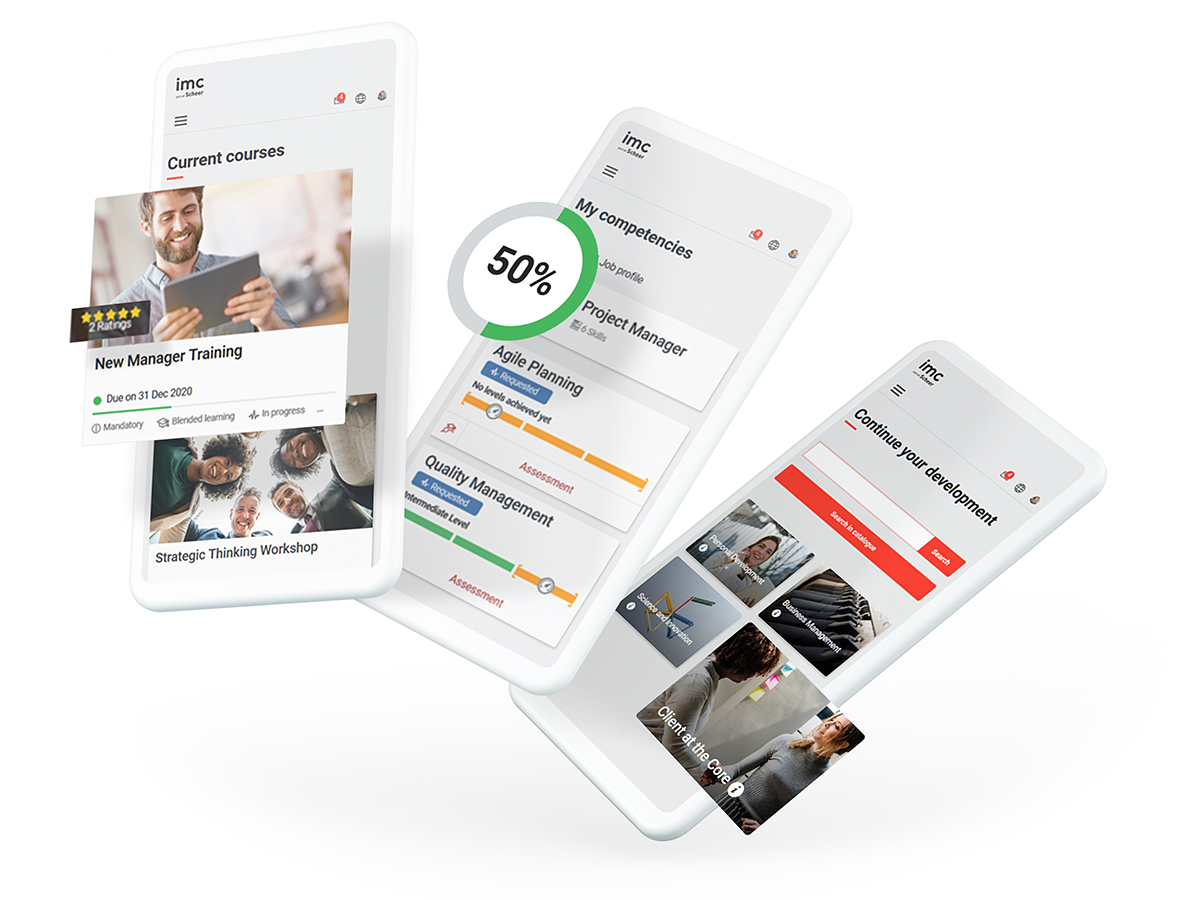
Panel Talk: Fosway Group, Learning Light and imc
As businesses emerged from lockdown and social distancing measures in many parts of the world, elearning experts from imc, Fosway and Learning Light got together remotely to discuss the post-pandemic future of learning platforms in 2022 and beyond.
Key topics discussed include:
- LMS, LXP, NGDLE, Suites…?
- Headless LMS
- Concrete Advice for the Learning Platform Buyer
- Learning Designer to Performance Consultant
Hosted by Alison West, Pre-Sales Consultant of imc Learning in London, the panel of experts discussing these topics consisted of:

Fiona Leteney
Senior Analyst at Fosway Group, who has worked in the learning technology market for over two decades, and brings a wealth of insights from customers, vendors and the market.

David Patterson
Lead eLearning Consultant at Learning Light, who has been influential in the world of elearning and learning technologies for over a decade.

Sven Becker
Executive Board Member at imc, with over a decade’s experience from the vendor’s perspective.

LMS, LXP, NGDLE, Suites…?
Alison kicked off the discussion commenting that there is a large and growing list of terminology describing the learning platforms used for education and training today, so asked David to, for those uninitiated in some of these terms, to describe the differences between them.
David
The learning management system (LMS) has been around as a term for many many years, probably dating back to the late 1990s.
Recently we’ve seen the evolution of the term learning experience platform (LXP), which is interesting as people are trying to present a new take on digital learning. Part of the motivation is that a new such platform is not an LMS, which is more process-focused, whereas the LXP is more content-orientated.
However, in David’s view, we are now seeing these two types of platform on the market fuse together, with many LMS providers adding LXP functionality and vice-versa.
Does this matter? Well yes - I buyer of these learning technologies will want to have a clear understanding of what these terms mean. So it’s important, and a goal of this discussion, to explain and simplify some of the terms being used today.
Alison commented to Fiona that at Fosway, they seem to be moving away from terms such as LMS and LXP and using words such as Suites, asking why that is.
Fiona
Building on what David said, Fosway have also been seeing a merging of the ideas of LMS and LXP. In fact, before the concept of Suites, Fosway had been using the term Next Gen Learning Environment as a term, because they never really saw LXP as a valid term to describe what a system does.
In Fosway’s view, LXP is a marketing term, which was launched into the market and everyone latched onto it. This was because buyers wanted to be buying into the latest technology as opposed to a ‘legacy LMS’. At the same time, vendors didn’t want to be seen as a legacy LMS so adopted the term as well.
In reality, when talking to a corporate learning platform, when Fosway ask what they mean when they say they are looking for an LXP, the answer is always very different. So, it was a couple of years ago that Fosway started moving away from using the words LMS and LXP and started talking about Suites and ‘Specialists’.
For example, if you’re a smaller organisation and you only have budget for one system - that’s when you need a Suite, because that’s going to give you the broader range of functionality that you’re going to need. If you then have the opportunity to dig deeper into a particular area, you then might look at one of the Specialists.
Perhaps you’d look at a specialist tool for content curation, or one that focuses on Instructor-Led Training (ILT). Perhaps you’d add these in, and some vendors facilitate this, whitelisted, to add depth of specialism.
That’s why Fosway use the term Suite for not only learning systems, but across HR technology as well.
So, Suites for broad capability, with Specialists usually focusing on just one area.
Alison then put the same question to Sven to gain the platform provider’s perspective.
Sven
This difference these days is that there is no longer a clear orientation driven by the customer. imc traditionally built systems that were relatively process-driven as David had mentioned.
The idea of ‘Learning Experience’ was seen as a commodity - normal for imc’s solutions. Learning Experience is a concept, not a system, so to create a good learning experience, you need to look at the concepts from the learner’s perspective.
An important shift is to look ahead, years into the future, when creating an LMS, NGLP (Next Generation Learning Platform) or whatever you want to call it. It isn’t just about post-covid planning - that’s an obvious example, but it should have been part of the thinking long before that and must look beyond the immediacy of pandemic and post-pandemic requirements.
What is the user’s working environment? For many, it revolves around a mobile world and great systems are considering the needs of users who need a mobile-first learning system.
It’s not just about “does this look good on both a desktop and a mobile” - what is the environment of both types of user? Does the mobile user have different sound restrictions because they might be learning on a busy train for example?
To broaden the conceptual thinking even further on the part of the vendor, we need to think about the complete Employee Experience and how does learning dovetail with that. After all, learning experience is just part of the employee experience.
So, for those feeling overwhelmed by all the terminology still around and the level of choice and complexity involved in the buying process, how should the buyer deal with that overwhelm?
David
“Listen to someone like Fiona or myself!” People at the likes of Fosway and Learning Light spend their time listening to the business needs of organisations and developing an understanding of their learning requirements.
From that, a consultant can uncover the types of learning technology that the buyer will need. Sven made a good point that learning experience is really a concept, rather than a system, and that’s an important takeaway. There will, though, always be technology that facilitates that - and some doing it better than others.
Learning Suite is a useful term as well - and the best suites are getting bigger and more capable than ever before. Therefore, it’s important as the client to establish in advance what your learning outcomes are, what the learner journeys are, and what the data is that you’re going to need to understand to underpin your learning and bring back to the wider organisation.

Headless LMS
So, what is the headless LMS and how is it different from integration of deep content?
David
The concept of the headless LMS has emerged based on the world of content marketing. It springs from the idea of the headless CMS (content management system).
What those systems do is push content out across every channel. The ‘head’ used to be the website, but that has been kind of cut off. The CMS now is presenting content through social media channels, productivity suites, websites and even VR.
Several learning platform vendors have looked at this trend and said “Yes - this is a valid concept for learning as well”.
This is an evolution, not a revolution, as some companies such as imc have been pushing out highly evolved APIs and deep links into learning platforms and integrated content. The headless LMS is simply the next step on this journey, putting the player into the system.
So, the player will start to appear within Microsoft Teams, Slack, your CRM or your CMS, and the learning will then be instantly available to your learners at the very moment they need it. Incredibly rich data will then come back into the core learning platform / suite and really enhance your overall business analytics as well.
Fiona
There are two requirements that tend to focus corporate engagement with Fosway. Often, large organisations are managing multiple learning platforms and are looking for a single point of access to avoid or eliminate confusion.
On the other hand, some companies want to facilitate access to learning wherever the learners happen to be at any point in time, and to then feed back into the learning system.
This highlights the need for integration. Back at the start of the pandemic, 84% of business leaders were saying “Now more than ever, we need to integrate the learning systems with our business applications, such as MS Teams or Slack”.
Fosway brought together a dozen corporate leaders for a roundtable discussion of this issue, and found among them a lot of frustration with the complexity involved in making integration happen. Yes, APIs exist, but it’s rarely as simple an exercise as they were sold on.
Like David said, the headless LMS is an important concept that is starting to improve this, and learning systems like imc are helping in ensuring that data is flowing through the whole tech ecosystem. This includes the learning ecosystem of course, but also the HR systems and the wider business ecosystems out there.
The more we can get that data flowing through the whole ecosystem, the better our business decision making can be, and it’s that need for integration that’s coming through loud and clear from corporates.
Sven
It’s important to note that headless LMS is not just the next marketing term - headless is a complex monster!
Sometimes vendors say “it’s OK, we have open APIs, everything is easy” but then the customer finds that this isn’t true. API management is one of the most complex areas of IT. This is why we have to talk about things like RPA - Robotic Process Automation - to help with API management.
Again, headless is a concept, not a technology, and it’s about how we structure our learning ecosystem. The learning ecosystem is a culture thing, not a technology thing.
This is all about the flow of work - “how can we bring content to our people more easily?”.
For example, way back in 2009, Deloitte published a study where they had looked at the modern learner. They found that even then, on average people were looking at their smartphone 9 times per hour to check if there was a new message.
So we are driven by the ‘pull’ of information. The current standard learning management system is not ready for this - you have to log in, go to your course, open the right bit of learning etc - but that’s just not how we interact with information today.
If we know that people are checking their phones anyway, why don’t we push information in that direction, such as a reminder about key points from last week’s instructor-led training for example - when and where it might be helpful and appropriate.
Where this will become more important over the next 5 years is in the greater adoption of IoT - the Internet of Things.
We already have Internet enabled fridges. A fridge is able to ‘buy’ milk. In the same way, if we can see that a member of the team is on the train on their way to see a client, why not send them a push notification with three key points to remember about that client for example?
This is learning in the flow of work - it’s context-based and it’s what we mean by headless. If we think purely in ‘portal’ terms, whether it’s LMS, LXP or whatever, where you have to go and log in, we’re creating a specific access point for learning and that just won’t be the future.
Learning should be ubiquitous, around us all the time, and the culture should be driven by the learners themselves and how they work.
Sometimes, customers come to imc and say “give us all the APIs and let’s integrate everything” but we try to say “wait, let’s look at what we need, let’s look at the culture you are trying to create”.

Concrete Advice for the Learning Platform Buyer
So, for those looking to ensure their elearning system is future-ready and future-proof, what concrete advice can you give to a learning platform buyer in the post-covid world?
David
It really is about starting at and thinking through at the conceptual level. My own work is a lot about building conceptual models and looking at the information flows around that.
Worry first about how you want to structure your learning and keep the needs of your learners front of mind at all times. The choice of technology can then come after that and be based on how you want to deliver on those learner needs.
Fiona
Of course, Covid has meant that we’ve needed to move more of our training online. We’ve been talking a lot about bite size learning and microlearning for sometime, but the highest value training - onboarding and leadership - has traditionally been classroom-based.
That kind of training has very quickly been moved online - which was necessary and it’s great that it happened, but we now need to look very carefully from the corporate, vendor and learner perspectives at what that should really look like.
20 years ago, we went from classroom-based training to elearning for all the compliance stuff. This took the engagement piece out of the mix along with the trainer, and people started to hate the ‘click Next’ style elearning - rightly so.
The risk now is that learners could start to hate more areas of training now that more has been moved online if we don’t get it right. We need to create a safe place of learning where people can join their cohort to collaborate, do joint assignments etc.
We need to look carefully at how learning technology can best facilitate this and must not now sit back on our laurels and say - “we got all our training online so all is fine”.
Learning Designer to Performance Consultant
Sven built on the buyer tips from Fiona and David, offering advice on how L&D approaches elearning…
Sven
We might want to look at how learning is structured within the organisation and perhaps move some L&D roles away from just learning design and into being more of a ‘Performance Consultant’.
A learning designer always asks “what is the learning outcome of this programme?”. We need to ask ourselves ”What is the business outcome?”.
This is often the failure of learning design - we identify a learning outcome but it doesn’t feed into any business outcome.
When you move the Learning Designer to become more of a Performance Consultant, you start to create the best of both worlds - learning outcomes that are fully aligned with the business goals.

Fosway Group: "Focus on your learning ecosystem"
Terms such as LMS, NGLE and LXP are confusing for corporate buyers.
Fosway Group's learning industry analyst Fiona Leteney dives into the matter.

Informal learning: Everyday hero of work
“Formal learning is like riding a bus. Informal learning is more like cycling.” We explain what this means and share some key facts and recomemndations

More about our LMS
If you would like to learn more about imc's Learning Management, check here for more information.

